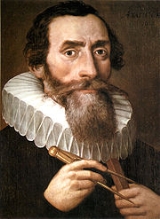
mathematician
, astronomer
and astrologer
. A key figure in the 17th century scientific revolution
, he is best known for his eponym
ous laws of planetary motion
, codified by later astronomers, based on his works Astronomia nova
, Harmonices Mundi, and Epitome of Copernican Astronomy. These works also provided one of the foundations for Isaac Newton
's theory of universal gravitation
.
During his career, Kepler was a mathematics teacher at a seminary
school in Graz
, Austria, where he became an associate of Prince Hans Ulrich von Eggenberg
.
Discover the force of the heavens O Men: once recognised it can be put to use.![]()
He who will please the crowd and for the sake of the most ephemeral renown will either proclaim those things which nature does not display or even will publish genuine miracles of nature without regard to deeper causes is a spiritually corrupt person… With the best of intentions I publicly speak to the crowd (which is eager for things new) on the subject of what is to come.![]()
Nature uses as little as possible of anything.![]()
We do not ask for what useful purpose the birds do sing, for song is their pleasure since they were created for singing. Similarly, we ought not to ask why the human mind troubles to fathom the secrets of the heavens. The diversity of the phenomena of nature is so great and the treasures hidden in the heavens so rich precisely in order that the human mind shall never be lacking in fresh nourishment.![]()
In Terra inest virtus, quae Lunam del.![]()
Geometry has two great treasures; one is the Theorem of Pythagoras; the other, the division of a line into extreme and mean ratio. The first we may compare to a measure of gold; the second we may name a precious jewel.![]()
I much prefer the sharpest criticism of a single intelligent man to the thoughtless approval of the masses.![]()
I used to measure the heavens, now I measure the shadows of Earth. Although my mind was heaven-bound, the shadow of my body lies here.![]()

